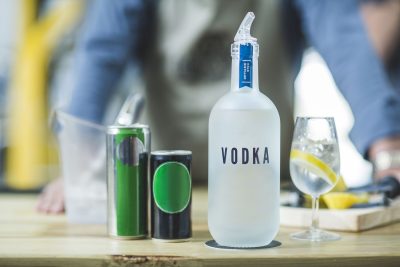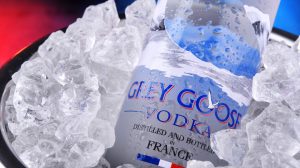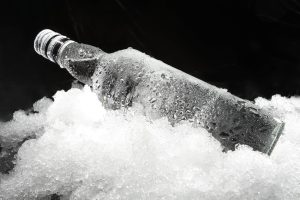Ever wondered if that bottle of vodka in your freezer will turn into a solid block of ice? Does vodka freeze? Get ready to have your mind blown as we explore the science behind freezing vodka and the best ways to store it for a perfectly chilled sip every time.
Yes, vodka can freeze. Most alcoholic beverages have a lower freezing point than water due to their alcohol content. The freezing point of pure alcohol is at -114.1 °F, while that of water is at 32 °F. Vodka, which is typically around 40% alcohol by volume (ABV), will have a freezing point between those two temperatures.
However, most household freezers are not cold enough to freeze vodka, typically only reaching temperatures between 0 and 20°F. If you put vodka in the freezer, it will become slushy but not solid.
Does vodka freeze?
Yes, vodka does freeze, as it contains alcohol which has a lower freezing point than water. The freezing point of alcohol depends on its concentration; the higher the concentration of alcohol, the lower the freezing point.
The typical freezing point of vodka, which is usually around 40% alcohol by volume (ABV), is around -16°C (3.2°F). However, it’s important to note that vodka should not be stored in a household freezer, as temperature fluctuations can cause the liquid to expand and potentially damage the bottle.
Instead, vodka should be stored in a refrigerator or a wine cooler set at a temperature around -18°C (-0.4°F) to -20°C (-4°F) for the best chilling results.
Can you freeze vodka in a home freezer?
Yes, you can freeze vodka in a home freezer. However, the freezing point of vodka is lower than that of water because of its high alcohol content.
Therefore, it will not freeze solid at the same temperature as water and other non-alcoholic liquids. Instead, it will become slushy and semi-frozen. This can be a desirable effect for some drinks, such as a frozen vodka martini.
It is important to note that freezing can cause the liquid to expand, so it is important to ensure that the bottle is properly sealed and has enough space in the freezer to accommodate this expansion.
If the bottle is not sealed properly, the expansion of the liquid can cause the bottle to break. If the bottle is not given enough space in the freezer, the expansion can cause the bottle to become distorted.
Additionally, it is worth noting that freezing can change the taste and texture of vodka. The freezing process can cause the liquid to separate, creating a cloudy appearance and a different texture when thawed.
It’s also worth noting that vodka can be stored at low temperatures without freezing. So if you just want to keep your vodka chilled, it’s better to store it in the refrigerator.
How long can vodka be stored in the freezer before its quality deteriorates?
Vodka can be stored in the freezer for an extended period of time without significantly affecting its quality. However, there is a limit to how long it can be stored without the quality starts to deteriorate.
The exact time frame will depend on several factors, such as the alcohol content, the temperature of the freezer, and how well the bottle is sealed.
In general, vodka that is stored in the freezer at a consistent temperature of -18°C or lower can be stored for several years without a significant decline in quality. This is because, at such low temperatures, the chemical reactions that cause the vodka to degrade are slowed down considerably.
However, if the vodka is stored at a higher temperature or if the bottle is not sealed properly, the quality of the vodka may deteriorate more quickly. The alcohol content may change, the vodka may become cloudy, the taste may change, or the texture may become different.
It’s also worth noting that storing vodka in the freezer will not make it last indefinitely. It will not improve the quality, but it will slow down the process of deterioration.
The impact of freezing on the taste and alcohol content of vodka
Freezing can have an impact on the taste and alcohol content of vodka. The freezing process can cause the liquid to separate, creating a cloudy appearance and a different texture when thawed.
This is because as the liquid freezes, it pushes the impurities, such as protein and other organic compounds, to the surface. These impurities are not harmful but can affect the appearance and texture of the vodka.
The freezing process can also cause a slight change in the alcohol content. Alcohol has a lower freezing point than water, so as the vodka freezes, some of the alcohol will separate from the water and can be found in higher concentrations in the liquid that remains unfrozen.
This can cause a slight increase in the alcohol content of the vodka. However, this difference is usually not significant enough to be noticed.
Also, the taste of vodka can also be affected by freezing. Some people may notice a slight change in the taste, such as a slight loss of flavor or a change in the mouthfeel. This is because the freezing process can cause the vodka to absorb odors from the freezer and can also change the chemical composition of the liquid.
How to properly thaw frozen vodka
When thawing frozen vodka, it is important to do so slowly and properly to preserve the quality of the liquid. Here are a few steps you can take to properly thaw frozen vodka:
- Move the vodka from the freezer to the refrigerator: Take the vodka out of the freezer and place it in the refrigerator. This will allow the vodka to thaw slowly and evenly.
- Allow enough time for the vodka to thaw: Depending on the size of the bottle and the temperature of your refrigerator, it may take several hours for the vodka to thaw completely. It is important to be patient and not rush the thawing process.
- Shake the bottle gently: Once the vodka is thawed, shake the bottle gently to redistribute any separated liquids. This will help to restore the original consistency of the vodka.
- Check the appearance, smell, and taste: Before consuming, check the appearance, smell, and taste of the vodka. If the vodka has a cloudy appearance, a strange smell, or an off-taste, it may have been spoiled during the freezing process. In this case, it’s best to discard it.
- Store it in the refrigerator: Once thawed, it’s best to store the vodka in the refrigerator to keep it chilled, as it will not retain the same quality as when it was first bottled.
It’s also worth noting that it’s not recommended to refreeze vodka once it has been thawed, as this can cause further changes in the appearance, texture, alcohol content, and taste.
Difference between freezing and chilling vodka
Freezing and chilling vodka are two different methods of storing liquor, and they have distinct effects on the quality of the vodka.
Chilling vodka refers to storing it at a low temperature, typically between 0-4°C (32-39°F), in order to keep it cold and refreshing. This is the recommended storage temperature for vodka, and it will not affect the quality of the vodka.
Also, chilled vodka is best served at a temperature of around -5°C (23°F), which is the ideal serving temperature to enhance the aroma and taste of vodka.
Freezing vodka, on the other hand, refers to storing it at a temperature below freezing, typically around -18°C (0°F), in order to make it semi-frozen or slushy. As previously mentioned, freezing can cause the liquid to separate, creating a cloudy appearance and a different texture when thawed.
It can also cause a slight change in the alcohol content and the taste of the vodka. Freezing vodka is not recommended as a long-term storage method, as it can cause a decline in quality over time.
How to make frozen vodka drinks
There are several ways to make frozen vodka drinks, depending on the type of drink you want to make. Here are a few popular methods:
- Blender method: This is the most common way to make frozen vodka drinks. Simply add your ingredients, such as vodka, fruit, ice, and any other desired mixers, to a blender and blend until smooth. This method is great for making frozen cocktails like Margaritas, Pina Coladas, and daiquiris.
- Shaker method: If you want a more textured drink, you can use a shaker to mix your ingredients. Add your ingredients, such as vodka, fruit, ice, and any other desired mixers, to a shaker and shake until well-mixed and chilled. This method is great for making drinks like a frozen Cosmopolitan or a frozen Lemon drop.
- Ice cream method: To make a creamier frozen drink, you can add a scoop of ice cream or frozen yogurt to your ingredients. This method is great for making drinks like a frozen Mudslide or a frozen White Russian.
- Freezing Method: You can also freeze vodka in ice cube trays and use them to make frozen drinks. This method is great for making drinks like a frozen Vodka Martini or a frozen Lemonade Vodka.
When making frozen drinks, it’s important to use quality ingredients and adjust the ratio of ingredients to suit your taste. Also, it’s essential to use a blender or a shaker that can handle the consistency of a frozen drink; otherwise, you may end up with a drink that is not blended or mixed properly.
Can you use frozen vodka in cooking?
Yes, you can use frozen vodka in cooking. Vodka is a versatile ingredient that can be used in a variety of dishes, such as pasta sauces, marinades, and even desserts. When using frozen vodka in cooking, it’s important to keep in mind that the freezing process can cause the vodka to separate and become cloudy, which can affect the appearance of your dish.
One of the most popular ways to use frozen vodka in cooking is to make a vodka sauce. A classic vodka sauce is made by cooking crushed tomatoes with cream, butter, and vodka. The vodka adds a subtle, slightly sweet, and slightly bitter flavor to the sauce. Adding frozen vodka will help to chill the sauce, giving it a more refreshing taste.
Another popular way to use frozen vodka in cooking is to make a marinade. Vodka’s high alcohol content can help to break down the fibers of the meats, making them more tender. A marinade made with frozen vodka will help to chill the meats, giving them a more refreshing taste.
Frozen vodka can also be used to make desserts like sorbets, granitas, and ice creams. Frozen vodka can help to make these desserts more refreshing and less sweet.
It’s also worth noting that when using frozen vodka in cooking, you should use a measuring spoon to measure the amount of vodka you want to use, as the freezing process can cause the volume of the liquid to expand.
The effects of freezing on different types of vodka (e.g., flavored, infused)
The effects of freezing on different types of vodka can vary depending on the ingredients and method of production used to create the vodka. Here are a few things to consider when freezing different types of vodka:
- Flavored vodka: Flavored vodka is made by infusing vodka with different flavors, such as fruits, spices, and herbs. When freezing flavored vodka, the freezing process can cause the flavors to separate and become less pronounced. Additionally, the freezing process can cause the vodka to absorb odors from the freezer, which can affect the taste of the vodka. Therefore, it’s best to avoid freezing flavored vodka.
- Infused vodka: Infused vodka is made by steeping ingredients such as fruits, spices, or herbs in vodka. When freezing infused vodka, the freezing process can cause the ingredients to separate from the vodka, and the infusion may become less pronounced. Additionally, the freezing process can cause the vodka to absorb odors from the freezer, which can affect the taste of the vodka. Therefore, it’s best to avoid freezing-infused vodka.
- High-proof vodka: Vodka that is bottled at a higher alcohol content than other types of alcohol may not freeze solid in a standard household freezer. Instead, it will become slushy. This can be desirable for some drinks, such as a frozen vodka martini.
- Low-proof vodka: Vodka that is bottled at a lower alcohol content will freeze solid in a standard household freezer. Freezing can cause the liquid to expand, so it is important to ensure that the bottle is properly sealed and has enough space in the freezer to accommodate this expansion.
Generally, freezing can have varying effects on different types of vodka. Flavored and infused vodka may lose their distinct flavors and aromas, while high-proof vodka may not freeze solid. It’s best to avoid freezing flavored, infused vodka, and if you have to, use high-proof vodka for frozen drinks.
How freezing vodka affects its texture and mouthfeel
Freezing vodka can affect its texture and mouthfeel in a few ways:
- Change in texture: Freezing vodka can cause the liquid to separate, creating a cloudy appearance and a different texture when thawed. The freezing process can also cause the vodka to become thicker and more viscous, creating a different mouthfeel.
- Change in mouthfeel: The freezing process can also cause a change in the mouthfeel of the vodka. When vodka is frozen, it can create a thicker, creamier texture that can feel more substantial in the mouth. This can be a desirable effect for some drinks, such as a frozen vodka martini.
- Numbness: The freezing temperature of vodka can cause a numbing sensation on the tongue and lips. This can affect the perception of taste and texture and can also affect the overall enjoyment of the drink.
- Crystallization: When vodka is stored in the freezer, it can cause the formation of small crystals which can change the texture of the vodka, making it feel gritty or sandy.
It’s worth noting that the freezing process can cause the liquid to absorb odors from the freezer, which can affect the taste of the vodka and change the overall experience.
The effects of freezing vodka in a plastic bottle vs a glass bottle
The effects of freezing vodka in a plastic bottle vs. a glass bottle can vary. Here are a few things to consider:
- Glass bottles: Glass bottles are more durable and can withstand the freezing process better than plastic bottles. They are less likely to crack or break as the liquid inside expands during freezing. However, they are more fragile and can break if they are dropped or bumped.
- Plastic bottles: Plastic bottles are less durable than glass bottles and are more likely to crack or break as the liquid inside expands during freezing. However, they are more flexible, which makes them less likely to break if they are dropped or bumped. Additionally, plastic bottles are lighter than glass bottles and are more convenient to transport.
- Odor and taste: Both glass and plastic bottles can absorb odors and flavors from the freezer. However, glass bottles are less likely to absorb odors and flavors than plastic bottles.
- Leakage: If a bottle cracks or breaks during the freezing process, it can cause leakage. Glass bottles are less likely to leak than plastic bottles, but if it does happen, it can be dangerous because of the sharp edges of the broken glass.
- Recycling: Glass bottles are more easily recyclable than plastic bottles.
Overall, both glass and plastic bottles have their advantages and disadvantages when it comes to freezing vodka. Glass bottles are more durable, while plastic bottles are more flexible.
Glass bottles are less likely to absorb odors and flavors from the freezer, but plastic bottles are more convenient to transport. It’s important to be aware of the limitations of both types of bottles and take the necessary precautions to ensure the safety and quality of the vodka.
How freezing vodka affects the carbonation in mixed drinks
Freezing vodka can affect the carbonation in mixed drinks in a few ways:
- Carbonation loss: Freezing can cause carbonation to be lost in mixed drinks. As the liquid inside the bottle expands during freezing, the carbon dioxide bubbles that create the carbonation can be forced out of the liquid. This can result in a less carbonated drink when it is thawed.
- Carbonation release: When the frozen drink is thawed, the carbon dioxide that was forced out of the liquid during freezing can be released. This can cause the drink to become more carbonated than it was originally, resulting in a more effervescent drink.
- Carbonation change: The freezing process can also cause a change in the carbonation of the drink. The carbon dioxide bubbles can become smaller, resulting in a finer, more consistent carbonation.
- Carbonation retention: Some drinks are bottled under pressure and can retain their carbonation after freezing, but this is not always the case.
Freezing vodka can affect the carbonation in mixed drinks. The freezing process can cause carbonation to be lost or released, resulting in a less-carbonated or more-carbonated drink, respectively.
How freezing vodka affects the dilution of mixed drinks
Freezing vodka can affect the dilution of mixed drinks in a few ways:
- Dilution from the expansion: When vodka is frozen, the liquid inside the bottle expands. This can cause the drink to become more diluted when it is thawed. This is because the expansion of the liquid can cause the vodka to be pushed out of the bottle and mixed with the other ingredients, such as ice, resulting in a more dilute drink.
- Dilution from melting ice: When a mixed drink containing ice is frozen, the ice will melt as the drink thaws. This can cause the drink to become more diluted as the ice melts and mixes with the other ingredients.
- Dilution from thawing: When a frozen drink is thawed, the dilution level may change depending on how long it takes to thaw. If the drink is thawed slowly, the dilution level will be less than if the drink is thawed quickly.
- Dilution from shaking: When a frozen drink is shaken, it can cause the drink to become more diluted. This is because the shaking can cause the ice to melt and mix with the other ingredients, resulting in a more dilute drink.
Overall, freezing vodka can affect the dilution of mixed drinks by causing an increase in dilution due to the expansion of the liquid, melting ice, thawing, and shaking. It’s important to keep in mind that freezing can change the taste of the drink, so adjusting the ingredients and dilution level to your preference is important.
How freezing vodka affects the ice crystals formation in mixed drinks
Freezing vodka can affect the formation of ice crystals in mixed drinks in a few ways:
- Size and shape of ice crystals: When a mixed drink containing vodka is frozen, ice crystals can form. The size and shape of these crystals will depend on the freezing rate and temperature of the drink. Faster freezing rates and lower temperatures can result in smaller, more evenly distributed crystals.
- Texture: The formation of ice crystals can affect the texture of the drink. Smaller ice crystals can result in a smoother, creamier texture, while larger crystals can result in a more grainy texture.
- Consistency: The formation of ice crystals can affect the consistency of the drink. Smaller ice crystals can result in a more consistent consistency, while larger crystals can result in a more uneven consistency.
- Taste: The formation of ice crystals can affect the taste of the drink. Smaller ice crystals can result in a more refreshing taste, while larger crystals can result in a more bitter taste.
It’s worth noting that the formation of ice crystals can be influenced by the ingredients and methods used to make the drink. Drinks with a higher sugar content, for example, can form larger ice crystals than drinks with a lower sugar content.
Drinks that are shaken or stirred before freezing will also form smaller ice crystals than drinks that are not.
Conclusion
Do you need answers to the question does vodka freeze? You are just in the right place. Vodka can freeze, but the freezing point of vodka is typically lower than that of water, as alcohol has a lower freezing point.
The freezing process can cause changes in the appearance, texture, alcohol content, and taste of the vodka and can also affect the carbonation, dilution, and formation of ice crystals in mixed drinks.
It is important to store vodka properly and to thaw it slowly and carefully to preserve its quality. It’s also important to note that different types of vodka, such as flavored and infused vodka, may not be suitable for freezing. It’s best to avoid freezing flavored and infused vodka and uses high-proof vodka for frozen drinks.




